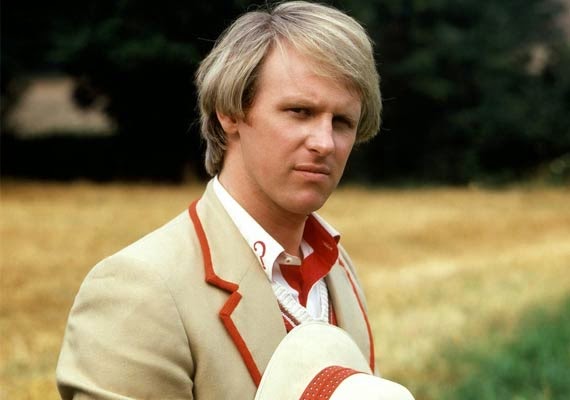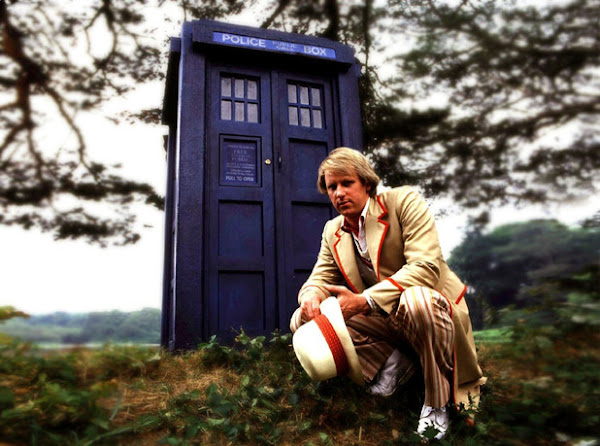“Y’know…I loved being you. Back when I first started, at the very beginning, I was always trying to be old and grumpy and important – like you do when you’re young. And then I was you. And it was all dashing about, and playing cricket, and my voice going all squeaky when I shouted – I still do that!...cos you know what, Doctor? You were MY Doctor…All my love to long ago.”
David Tennant as the Tenth Doctor, speaking to the Fifth, in Time Crash, written by Steven Moffatt.
It’s entirely fair to say that Time Crash is a pure love letter to the Fifth Doctor and the changes Peter Davison’s casting brought to the role of the world’s favourite Time Lord. It was written by Steven Moffatt, an ardent fan of many Doctors, and played with absolute conviction by Tennant, who like many fans of his age, straddled the Baker/Davison era at the time of their greatest fandom.
But more than that, it helps articulate some of the wonderful ways in which the Fifth Doctor stamped a whole new WAY of being the Doctor on the character, while following on from the longest-running and probably best-remembered Classic era version of the wandering Time Lord.
It may be a mistake to gulp too much at the scale of the task of taking over from Tom Baker in a role it’s fair to say he had made entirely his own. After all, Patrick Troughton took over from THE only Doctor the world had known, and if he hadn’t made a success of it, the show would have been cancelled there and then. Jon Pertwee too faced an uphill battle with behind-the-scenes forces, coming in at a time when the option of cancelling the show was strongly considered, before setting it within strict limitations allowed it to carry on. Even Baker himself, when he first took the role, got some savage reviews from viewers who were loyal to ‘their’ Pertwee incarnation.
But it’s true to say that Peter Davison came to the role at a higher peak of visibility than any of his predecessors, having made the ‘loveable rogue’ that was Tristan Farnon a household favourite in All Creatures Great And Small, and having two sitcoms running concurrently on two different channels – both of which (Holding The Fort and Sink Or Swim) were broadcast during his early tenure as the Doctor. So there was a significant pressure on Peter Davison, not just as the actor taking over from both the moulded character and the huge personality of Tom Baker, but also as one of the more visible, known faces on TV at the time.
Certainly on the surface, Davison’s Doctor could not have been more different from his predecessor – in fact, from MOST of his predecessors in the role. If anything, and if you’re deliberately looking for resonances and similarities, you could say there’s a touch of Troughton in the way he moves through time and space. Unless forced to do so, he rarely pushes himself to the front of a scene, letting people play out the dramas of their lives. But when the cleverest life form in the room is needed, he’s happy to come forward, to use his intellect in a positive cause, and to stand against the evils of the universe.
But where the Hartnell, Pertwee, and Baker incarnations distinctly STRODE about the universe, neither Troughton not Davison really did. And Davison more than any other actor up until his time brought something that hadn’t been tried before to the role.
He was YOUNG.
When people thought of the Doctor before Davison, they thought of either old or older men – middle-aged by human terms, at least. People who could naturally channel the gravitas of being clever and important when they needed to be. Peter Davison brought youth to the character, but balanced it always with the responsibility of BEING the Doctor. When, decades later, Matt Smith’s Doctor asked if he just had “a face that nobody listens to – again,” it was a direct call back from the new youngest Doctor to the previous record-holder, Peter Davison. Particularly, his lines in The Caves Of Androzani come to mind – “I am telling the truth. I KEEP telling the truth. Why is it no-one believes me?”
And while for his own part, Davison has maintained that he was given the advice by a fan to play the Fifth Doctor “like Tristan, but kind,” there’s a lot more than that going on in his performances. The youth is there, not only in the face and body, but in a smile that never intimidates or scares, but is just happy to be alive. It’s there in an enthusiasm for everything from the list of simple pleasures he describes to the Cyber Leader, to a good game of cricket, to an interesting book, to meeting new people and experiencing new things. He does all this on his own terms, letting the universe surprise him (as in Kinda), without in any sense ever having to dominate a room or a conversation unless someone is needed to stand between the innocents of the universe and its bullies.
When that person IS needed, Davison – perhaps because he usually ONLY does it in those circumstances – fills up with the full, ancient knowledge and power of the Doctor, and will stand. Whether it’s squaring up the shiny new Cyber Leader in Earthshock, playing a crafty game in Four To Doomsday so as not to let Monarch know what he’s planning, interceding as his Third incarnation did with the Silurians and Sea Devils in Warriors of the Deep, or crashing Stotz’s spaceship under threat of death in The Caves Of Androzani, all the way through his tenure, the Fifth Doctor was never NOT the Doctor. He was just the Doctor in a whole new mould.
Naturally, in the wake of Tom Baker, there were plenty of people who thought this new way of being the Doctor was actually NOT being the Doctor (rather forgetting quite how different each previous incarnation had been from what came before).
Peter Davison though, from the simple fact of his youth, through his extended Zero Room sojourn in Castrovalva, through his quieter way of walking through the universe, to his always standing against pettiness and evil and trying to help the innocent, not out of some grand alien purpose, but just because it’s the right thing to do (“Tristan, but kind”) has actually left a much larger impact on New Who than many of those who came before him.
The very idea that the Doctor needn’t be particularly physically imposing resonates in arguably the Tenth and Eleventh Doctors, and certainly the Thirteenth. The idea that the Doctor’s body needn’t always be middle-aged or older-looking again frees up the likes of David Tennant, Matt Smith and Jodie Whitaker to take on one of TV’s most cherished and enduring roles, alongside the likes of Christopher Eccleston and Peter Capaldi.
The whole notion of a Doctor needing time to finish ‘cooking’ has become a staple of the Doctor’s post-regenerative process. With the honourable exception of Troughton, who can be thought of as disorientated because he’s never (at least as far as he knows!) done it before, and arguably a little with Pertwee after his regeneration is forced on him, the post-regenerative troubles came in specifically with Davison, and featured in at least the next three Doctors, and then with 10, 11, and 12.
Again, you can think of throwbacks to the Hartnell and Troughton Doctors, but the relatively unassuming nature of Davison’s Doctor through most of his time also argues strongly for his being the first of the Doctors to make a difference just because (with his occasionally Edwardian ideas) it feels like the right thing to do. That’s a premise that would of course be most eloquently expressed by his much more speech-heavy successor, Peter Capaldi. “I do what I do because it’s RIGHT!” And also of course, Davison leaves his mark on the Capaldi incarnation right up to the end, with that simple invocation to “Be kind.” If you can’t be “Tristan, but kind,” at least be kind.
Perhaps most of all though, the Davison legacy can be seen in Jodie Whitaker’s performance. With an equally easy, unassuming walk through the universe, and an equally sunny, face-illuminating smile, she’s “just a traveller, helping out. Sometimes I see things that need fixing, and I fix them.” While both his Doctor and hers – like many others – are prone to occasional bursts of anger or annoyance, the lightness of touch and the lightness of step of the 13th Doctor feels inherently the same as the young-bodied Fifth Doctor when he found himself incarnated and left to make the best of the life he had.
As he himself said in Castrovalva, “That’s the trouble with regeneration. You never know what you’re going to get.”
Back in Castrovalva, neither did we. But what we got in the Fifth Doctor was an intuitively new way to play the Time Lord, that gave us three years of performances that were often significantly better than the scripts they were in, and many years more of audio joy at Big Finish. And the other thing we got was a Time Lord who broke the mould and showed that the Doctor wasn’t just one thing with occasional explosive differences of style. There were any number of ways to play the Doctor, and still stay true to the fundamental core of the character.
Whoever your favourite Doctor is, if they’re anyone since Davison hung up his celery on-screen, you owe him a debt of gratitude, for showing – as Patrick Troughton had originally shown back in the Sixties – that there’s much more to the Doctor than any one thing. The Doctor can be anything and everything. And one of the best things they can ever be is Peter Davison’s Fifth Doctor.
Tony lives in a cave of wall-to-wall DVDs and Blu-Rays somewhere fairly nondescript in Wales, and never goes out to meet the "Real People". Who, Torchwood, Sherlock, Blake, Treks, Star Wars, obscure stuff from the 70s and 80s and comedy from the dawn of time mean he never has to. By day, he runs an editing house, largely as an excuse not to have to work for a living. He's currently writing a Book. With Pages and everything. Follow his progress at FylerWrites.co.uk




























No comments:
Post a Comment